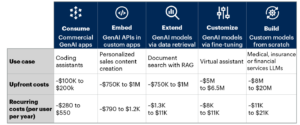Generative AI is all the rage, as companies of all stripes rush to adopt it to gain a competitive advantage. But how many of them have actually deployed their GenAI apps, or gained a return on their investment? What are the biggest barriers to GenAI adoption? We dug into various studies to gain quantitative answers to those questions.
The GenAI adoption rate varies from survey to survey, but most show a large majority of companies are somewhere on the path to GenAI adoption. That could mean anything from planning to adopt it or actually putting a GenAI app into production.
For instance, a recent Hitachi Vantara survey of IT leaders found that 97% of them consider GenAI to be one of their top five priorities. That matches a recent EY survey, which found that 95% of senior IT leaders say their organizations are currently investing in AI.
Those figures are a little higher than those from Cloudera, which recently published a study concluding that 88% of enterprises are adopting AI in some capacity. Starburst says a recent survey it conducted found 87% of organizations express “a strong or very strong desire” to implement AI within the next 12 months.
So clearly, there’s no shortage of interest in GenAI. But how many companies have actually put GenAI apps into production?
GenAI In Production
For insight into GenAI apps going from proof of concept (POC) into production, we looked to recent Google Cloud survey of more than 2,500 tech execs, which said that 61% of the respondents say they have already deployed at least one GenAI application in production.
Another data point comes from Dataiku, which interviewed 200 senior analytics and IT leaders around the world and concluded that only 20% of GenAI applications that enterprises have developed are currently in production.
Datanami’s Ali Azhar recently reported on Deloitte’s “State of Generative AI in the Enterprise Q3” report, which showed that 67% of organizations are increasing investments in GenAI due to strong early value. “However, 68% have moved only around one-third (30%) or fewer GenAI experiments into production,” Azhar writes.
“The report also reveals that business leaders are becoming less enthusiastic about GenAI, with the initial fervent excitement shifting toward a more critical evaluation of GenAI’s actual impact on business outcomes,” he continues.
Gartner threw some cold water on the whole GenAI adoption thing recently when it predicted that “at least” 30% of GenAI projects will be abandoned after proof of concept by the end of 2025, citing poor data quality, inadequate risk controls, escalating costs, and unclear business value.
“After last year’s hype, executives are impatient to see returns on GenAI investments, yet organizations are struggling to prove and realize value,” Rita Sallam, a distinguished VP analyst at Gartner, said during the Gartner Data & Analytics Summit in Sydney last month, according to Gartner’s press release.
On average, it looks like fewer than half of GenAI ever make it out of POC into production. That’s not hard to believe for a cutting-edge technology like AI. For the GenAI apps that do make it to the real world, what kind of return on investment (ROI) are they getting?
GenAI ROI
While some GenAI projects will inevitably fail, some companies are reporting a positive return on their GenAI investments. Google Cloud said in its press release that 86% of GenAI adopters reported an increase in revenue, with an average return of 6%.
The more you invest, the bigger your return. That’s the takeaway from EY’s study, which said in a press release: “Senior leaders whose organizations are investing in AI and whose current budgets for AI investments are 5% or more of their total budgets saw higher rates of positive return across dimensions surveyed when compared with those who spend less than 5%.”
EY said the percentage of companies investing $10 million or more in AI is set to nearly double next year to 30%, up from 16% currently investing at that level.”
A 2023 Gartner survey of about 800 IT leaders found that respondents reported GenAI generated a 15.8% average revenue increase, 15.2% average cost savings, and 22.6% average productivity improvement.
Of the 45% of executives who reported improved productivity in the Google Cloud survey indicated that employee productivity has at least doubled as a result of GenAI rollouts. It also found that 56% of executives reported that GenAI has bolstered their organization’s security posture, with 82% of those exes citing improved ability to identify threats and 71% reporting a reduction in time to resolve a security issue.
A recent study from Deloitte’s Technology Trust Ethics practice found 77% of C-level executives surveyed say they’re confident their workforce is well-equipped to make ethical AI decisions. “However less than one-quarter (24%) allow professionals to make these decisions independently,” Deloitte said in its press release.
The survey found that 77% of respondents cite supply chain responsibility as the biggest positive impact of GenAI, followed by brand reputation (75%), and revenue growth (73%). “When it comes to their workforce, respondents predict AI to have a positive impact on employee retention (82%) followed by worker well-being (77%) and accessibility to professional education (77%),” the company said.
GenAI Investment
GenAI investment is expected to grow 30% over the next three years, according to a new report by Boston Consulting Group (BCG) titled “IT Spending Pulse: As GenAI Investment Grows, Other IT Projects Get Squeezed.”
The report is based on a survey of 330 IT leaders, which found that “leaders from companies with high GenAI maturity anticipating their return on investment will be three-times higher over the next three years than that of companies with little or no adoption of the technology,” the company said in its press release.
The GenAI spending increase comes against a backdrop of a 3.2% increase in IT budgets last year, and a forecasted 3.3% increase in 2024. Other IT priorities that are seeing increased budget include general machine learning, with a 30% net spend increase; security infrastructure (27%), cloud services (30%), and analytics (18%), BCG found.
GenAI is spurring a huge increase in AI spending, according to IDC, which recently issued a report finding that the market for AI platforms will grow at a compound annual growth rate (CAGR) of nearly 41% through 2028, at which point $153.0 billion will be spent on it.
“AI adoption soared to new heights in 2023 with worldwide AI platform software revenue growing 44.4% year over year to $27.9 billion,” IDC said in its press release. The top AI platform providers are Microsoft, Palantir, OpenAI, Google, and Amazon Web Services, it says.
“Half of the organizations currently deploying GenAI in production have already selected an AI Platform, while most of the organizations that have already initiated significant investments will do so in the next six months,” IDC said.
Cloud-based AI platforms are growing faster than on-prem deployments, IDC said, with a five-year CAGR of about 51% for cloud-based AI. IDC says the factors favoring cloud-based AI are advanced security, data and regulatory compliance, and scalability.
It’s clear that companies are investing hundreds of billions in GenAI. So what are the factors holding up GenAI success?
GenAI Barriers
The Dataiku study identified that the biggest concerns around GenAI are a lack of governance and usage control (cited by 77% of the survey respondents), data quality (45%), data tools mismatch (44%), and data access (27%).
Cloudera’s State of Enterprise AI and Modern Data Architecture report, which is based on a survey of 600 IT leaders around the world, found that the top barriers to adopting AI were worries about the security and compliance risks that AI presents (74%), not having the proper training or talent to manage AI tools (38%), and AI tools being too expensive (26%). The survey takers also highlighted contradictory datasets (49%), an inability to govern data across platforms (36%), and too much data (35%) as concerns.
“While 94% of respondents said that they trust their data,” Cloudera said in its press release, “55% also said they would rather get a root canal than try to access all of their company’s data.” (We wish more tech companies would adopt common measures of pain like this.)
Accessing real-time data will be critical for GenAI success, according to Starburst, which reports that 62% of its survey respondents emphasize real-time data in successful GenAI deployments.
A recent IBM Institute for Business Value study found that only half (50%) of respondents say they are delivering on key responsible AI capabilities for explainability, and even fewer say they are delivering capabilities for privacy (46%), transparency (45%) and fairness (37%).
A majority (80%) of the CEOs who participated in the global study of 2,500 C-level tech execs said transparency in their organization’s use of next-generation technologies, such as generative AI, is critical for fostering trust. “Yet, most tech CxOs acknowledge their organizations are falling short on delivering core responsible AI practices at scale,” IBM said in the press release.
Security concerns are rampant around GenAI. A new report from AppOmni found that 38% of organizations are concerned about GenAI security risks related to private data and company secrets. That jibes with another study from Pluralsight, which found that 56% of security professionals are concerned about AI-powered threats.
“Over half of surveyed technologists are either extremely concerned or moderately concerned about AI-powered threats, with only 6% saying they are not worried,” Pluralsight said in a press release.
More than 75% of respondents to the Pluralsight survey, which involved 100 C-level executives, indicated that threat intelligence and reverse engineering are the most valuable advanced cybersecurity skills of today, while 24% noted threat hunting among these skills.
Related Items:
Is the GenAI Bubble Finally Popping?
Reality Check for GenAI: Deloitte Finds Enthusiasm Tempered by Adoption Hurdles
The post GenAI Adoption By the Numbers appeared first on Datanami.




0 Commentaires